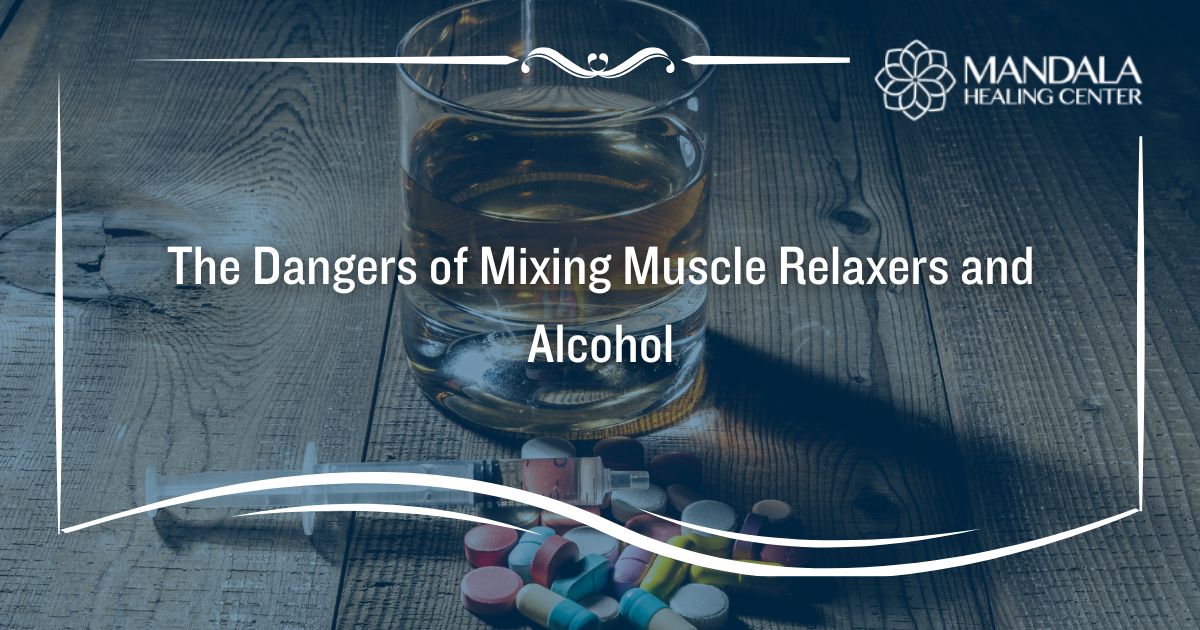According to the National Institute of Alcohol Abuse and Alcoholism (NIAAA), 78.3% of people aged 12 or older have consumed alcohol at some point in their lifetime.[1] While occasional alcohol use is usually not harmful, drinking in excess can cause an array of adverse effects.
Because alcohol is so embedded into our everyday lives, many people do not consider how the substance will interact with their medications. Unfortunately, there are many medications that people take daily that can cause grave consequences when mixed with alcohol. As a result, it’s important to speak with a doctor before consuming alcohol when you are taking a prescription medication.
One type of medication you should never mix with alcohol is muscle relaxers. Mixing alcohol and muscle relaxers can result in life-threatening side effects.
What are Muscle Relaxers?
According to the National Institutes of Health, muscle relaxants are “a type of drug that is used to relax the muscles and reduce tension, stiffness, and pain caused by muscle spasms or muscle spasticity.”[2]
While there are a variety of muscle relaxers out there, all of them work by blocking nerve impulses that cause pain. Examples of prescription muscle relaxants include:
- Carisoprodol (Soma, Vanodom)
- Chlorzoxazone (Lorzone)
- Cyclobenzaprine (Flexeril)
- Metaxalone (Metaxall, Skelaxin)
- Methocarbamol (Robaxin)
- Orphenadrine (Norflex)
- Baclofen (Lioresal)
- Dantrolene (Dantrium)
- Tizanidine (Zanaflex)
If you are suffering from muscle spasms, your muscles are contracting and tightening on their own. When this happens, you might experience a lot of discomfort or pain. Muscle relaxers work by relaxing your muscles, which prevents spasms from occurring.
On the other hand, some people taking muscle relaxers are suffering from muscle spasticity. This means their muscles are constantly spasming, making their body feel stiff, tight, and difficult to move, which is common among individuals suffering from conditions like multiple sclerosis or spinal cord injuries.
While muscle relaxers are important for people suffering from these types of muscle pain, they can also be addictive. As a result, if you are currently prescribed a muscle relaxant you must never take more than your recommended dosage.
Why Do People Mix Muscle Relaxers and Alcohol?
People mix muscle relaxers with alcohol for a variety of reasons. While some people might simply be unaware of the potential interactions between the two substances, others might purposefully combine them to experience a high.
If you combine muscle relaxants with alcohol, feelings of euphoria, relaxation, and drowsiness will increase. People may continue mixing the substances after accidentally or intentionally discovering the enhanced effect it causes.
On the other hand, some individuals might begin drinking alcohol to counteract the side effects of muscle relaxers. Sometimes, the side effects of these medications can be hard to cope with, causing someone to believe that drinking alcohol will relieve symptoms like nausea or headaches.
Unfortunately, mixing alcohol with your muscle relaxers will not counteract the side effects you are experiencing. Even further, this drug combination can lead to serious adverse health effects that may require emergency medical treatment.
The Signs of Muscle Relaxer Abuse
If someone is mixing muscle relaxers and alcohol to experience a high, they are abusing their medication. It can be difficult to determine whether a loved one is addicted to their muscle relaxers, especially if they are attempting to hide their substance abuse. Being able to spot the signs of muscle relaxer abuse can help you determine whether your loved one requires professional drug rehab.
Signs of muscle relaxer abuse include:
- Continuously requiring a larger dosage of muscle relaxers
- Attending more than one doctor to receive multiple prescriptions
- Lack of appetite
- Changes in sleeping habits
- Borrowing or stealing money to buy muscle relaxers on the street
- Lacking an interest in previously enjoyed activities
- Spending less time with family and friends
- Experiencing symptoms of withdrawal when the medication wears off
- Faking pain or injuries to receive muscle relaxer prescriptions
Risks of Mixing Muscle Relaxers and Alcohol
Muscle relaxers and alcohol are both depressant substances that slow down activity in your brain. When you combine two central nervous system depressants, the effects of both substances will be increased substantially.
The symptoms and risks of mixing these substances include:[3]
- Urine retention
- Blurred vision
- Memory problems
- Fainting
- Low blood pressure
- Liver damage
- Gastrointestinal damage
- Respiratory distress
- Blackouts
- Seizures
Because the effects of both substances become combined, your risk of overdosing also increases. If you or a loved one displays the following signs of a muscle relaxant overdose, contact emergency medical services immediately:[4]
- Changes in consciousness
- Hallucinations
- Seizures
- Respiratory depression
- Cardiac arrest
- Coma
- Death
Find Help for Muscle Relaxers and Alcohol Addiction
Mixing muscle relaxers and alcohol is a sign of substance use disorder. If you frequently combine these substances, you might be suffering from muscle relaxer addiction, alcoholism, or polydrug abuse. All of these conditions must be treated by a professional addiction treatment program.
At Mandala Healing Center, we can provide you with the tools and support you need to overcome your substance use disorder and achieve long-term recovery. To learn more about our alcoholism treatment programs, contact us today.
References:
- National Institute on Alcohol Abuse and Alcoholism (NIAAA): Prevalence of Lifetime Drinking, Retrieved April 2023 from https://www.niaaa.nih.gov/alcohols-effects-health/alcohol-topics/alcohol-facts-and-statistics/alcohol-use-united-states
- National Cancer Institute: muscle relaxant, Retrieved April 2023 from https://www.cancer.gov/publications/dictionaries/cancer-terms/def/muscle-relaxant
- National Library of Medicine: Alcohol and Medication Interactions, Retrieved April 2023 from https://www.ncbi.nlm.nih.gov/pmc/articles/PMC6761694/
National Library of Medicine: Baclofen Toxicity, Retrieved April 2023 from https://www.ncbi.nlm.nih.gov/books/NBK580550/












